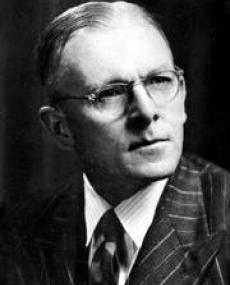
Alan Stewart Paton was born in Pietermaritzburg in KwaZulu Natal on 11 January 1903. His father, James Paton, a Scottish immigrant and civil servant, came to South Africa in 1895 and his mother, Eunice Warder James, was the daughter of English immigrants.
Neither of Paton’s parents was highly educated, but his father was deeply religious and a strict and controlling parent that used corporal punishment to control his sons. This led to Paton’s open opposition to any form of authoritarianism and physical punishment. His father also introduced him to literature and sparked a great love of nature in his son, which was apparent in his books. Paton especially enjoyed Walter Scott, Charles Dickens and Rupert Brooke, as well as the Bible. His family’s religious convictions and the Old Testament also influenced his work.
Paton studied at the University of Natal after which he taught at the Ixopo High School for White students. Here he fell in love with Dorrie Francis Lusted, a married woman. When Lusted’s husband died in 1928 they married and moved to Pietermaritzburg, where he continued teaching. The couple had two sons, but Dorrie died of emphysema in 1969. Paton published a book, Kontakion for you Departed, about their years together, in 1969. He married his secretary, Anne Hopkins, that year.
In 1935 Paton was appointed Principal of Diepkloof Reformatory for Young Offenders. This experience had a significant impact on his political development and he introduced several progressive reforms. He remained in the post for 13 years. During the 1940’s he travelled to Sweden, Norway and North America to study prisons and reformatories.
Paton began writing his first, and arguably most famous, novel, Cry, the Beloved Country, in 1946 in Trondheim, Norway. He completed the book on Christmas Eve of the same year in San Francisco. It was published in 1948 and was considered alternatively as revolutionary or sentimental by many White South Africans. The book became a massive success and by 1988 had sold more than 15 million copies internationally. It has also spurred two films, one made in 1951 and another in 1995, and has been credited with stimulating awareness of apartheid abroad.
After completing Cry, the Beloved Country Paton resigned from his post in Diepkloof and moved to the KwaZulu Natal coast to dedicate himself fully to writing. He was very prolific and published 19 books between 1948 and 1989.
In 1953 Paton’s desire to contribute socially inspired him and his wife to work at the Toc H Tuberculosis settlement in KwaZulu Natal. He also helped found the Liberal Party (LP) in the same year. His outlook on the political situation in South Africa had been deteriorating steadily and he reluctantly felt compelled to take part in politics. He was elected as leader of the party in 1955, succeeding Margaret Ballinger. He remained in this position until the party’s dissolution in 1968 due to new legislation banning multiracial political parties. Paton often felt divided in his calling and said, “My whole life has been a struggle between the writer and the activist, and it has not stopped”¦”
Paton continued to write and in 1960, after returning from an award ceremony for the American Freedom Award, his passport was confiscated. It was returned only a decade later.
In April 1988 Paton was diagnosed with inoperable cancer of the throat. He died in Durban on 12 April 1988, continuing to write until his death.